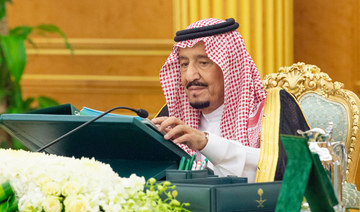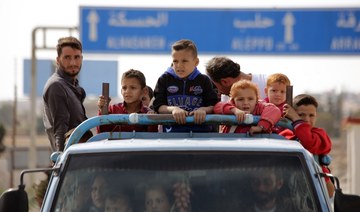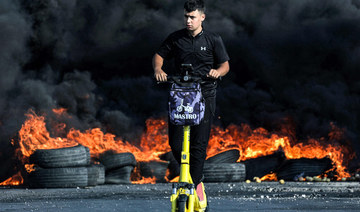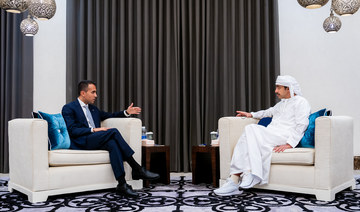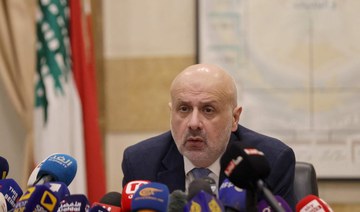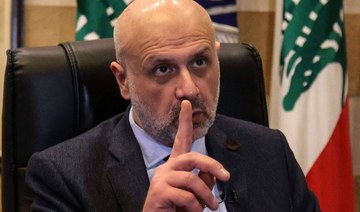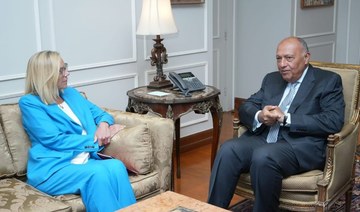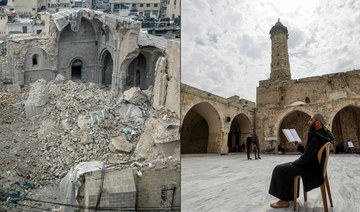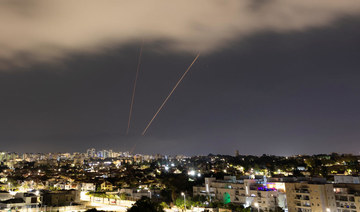ANKARA: US Vice President Mike Pence met President Tayyip Erdogan in Turkey on Thursday on a mission to persuade him to halt an offensive against Kurdish fighters in northeast Syria, but Turkish officials said the action would continue regardless.
The assault has created a new humanitarian crisis in Syria with 200,000 civilians taking flight, a security alert over thousands of Daesh fighters abandoned in Kurdish jails, and a political maelstrom at home for President Donald Trump.
Trump has been accused of abandoning Kurdish-led fighters, Washington’s main partners in the battle to dismantle Daesh’s self-declared caliphate in Syria, by withdrawing troops from the border as Ankara launched its offensive on Oct. 9.
Trump defended his move on Wednesday as “strategically brilliant.” He said he thought Pence and Turkish President Recep Tayyip Erdogan would have a successful meeting, but warned of sanctions and tariffs that “will be devastating to Turkey’s economy” otherwise.
The White House released a letter from Trump to Erdogan from Oct. 9 that said: “Don’t be a tough guy” and “Don’t be a fool!” Turkish broadcaster CNN Turk said Turkey had rejected Trump’s appeal to reach a deal to avoid conflict and the letter was “thrown in the trash.”
A Turkish official told Reuters: “The letter Trump sent did not have the impact he expected in Turkey because it had nothing to take seriously.
“What is clear is that Turkey does not want a terrorist organization on its border and the operation will not stop because of the reaction that has been coming.”
Pence and Secretary of State Mike Pompeo did not speak to reporters before the start of the meeting with Erdogan, but the official said they were likely to convey the same US demands, adding: “However, negotiating with a terrorist organization or turning back from the ongoing operation are not on the agenda.”
On Monday, White House economic adviser Larry Kudlow told CNBC that the United States was prepared to levy additional sanctions on if necessary “to keep Turkey in line.”
A top aide to Erdogan, Ibrahim Kalin, said Turkey’s foreign ministry was preparing to retaliate for the sanctions by its NATO ally.
Erdogan has dismissed the sanctions and rejected a global chorus of calls to halt the offensive, which Turkey says will create a “safe zone” extending 20 miles (32 km) into northeast Syria to ensure the return of millions of Syrian refugees and clear the area of Kurdish militia Ankara views as terrorists.
Turkey will end its operation when Kurdish forces withdraw from the “safe zone” and “no power” can deter the operation until it reaches its goals, the Turkish leader said.
Trump has defended his move to withdraw troops from Syria as part of a wider effort to bring US soldiers home from “endless wars,” despite criticism by members of his own Republican Party.
Turkey’s operation has allowed Syrian President Bashar Assad to send his Russian-backed forces to an area that had been beyond his control for years in the more than eight-year-old Syrian war.
It also prompted the Syrian Democratic Forces (SDF), of which the Kurdish YPG is the main component, to strike a deal with Damascus for its help in countering Turkish forces.
Russia has promised Turkey that the Syrian Kurdish YPG militia targeted by the offensive will not be in the Syrian territories across the border, Turkish Foreign Minister Mevlut Cavusoglu told the BBC on Thursday.
Earlier in the day, Russia’s foreign ministry spokeswoman said Syria should get control over its border with Turkey as part of any settlement of the conflict in the region.
Assad vowed that Syria would respond to the Turkish offensive on any part of its territory with “all legitimate means” available, Syrian state media said on Thursday.
Ankara views the US-backed YPG as a terrorist organization because of its link to Kurdish militants waging an insurgency inside Turkey, and had been infuriated by Washington’s support.
A Reuters cameraman along the Turkish border with Syria said clashes continued around the border town of Ras al Ain on Thursday and that Turkish warplanes were flying overhead after a lull in fighting overnight.
Ankara had previously said it has taken control of Ras al Ain and Tel Abyad, two key towns along the frontier.
The region’s Kurdish-led authority called for a corridor “to evacuate dead and wounded civilians” from Ras Al-Ain. It said people were trapped in the town, urging foreign powers including the US-led coalition and Russia, to intervene to get them out.
Syrian troops accompanied by Russian forces have meanwhile entered Kobani, a strategic border city and potential flashpoint for a wider conflict, said the British-based monitor the Syrian Observatory for Human Rights.
Lebanon’s Al-Mayadeen TV reported that Russian-backed Syrian forces had also set up outposts in Raqqa, the one-time capital of Daesh’s caliphate, which the Kurds captured in 2017 at the peak of their campaign with US support.
Hezbollah’s Al-Manar TV said from the Tabqa military air base near Raqqa that Syrian government troops had advanced in that area.
“We entered the Tabqa military airport easily, there was no difficulty,” an army officer told the channel from the base, where Daesh fighters executed scores of Syrian troops and circulated a video of their corpses in 2014.
Soldiers entered Tabqa and nearby villages on Monday, state media said, a deployment that restored the state’s foothold in that part of Syria for the first time in years.
With US air power and special forces, the SDF had battled for weeks in 2017 to take Tabqa and a nearby hydroelectric dam — the country’s largest dam — from Daesh.
The Kurdish-led administration in the region said the Turkish offensive had killed 218 civilians, including 18 children since it started a week ago. The fighting has also wounded more than 650 people, it said.
Turkish authorities say 20 people have been killed in Turkey by bombardment from Syria, including eight people who were killed in a mortar attack on the town of Nusaybin by YPG militants on Friday, according to the local governor’s office.
In Geneva, humanitarian agencies said they were struggling to meet the needs of up to 200,000 civilians who had fled the fighting and reported water shortages in the Syrian city of Hasaka.
The operation has also created a land-rush between Turkey and Russia — now the undisputed foreign powers in the area — to partition Kurdish areas that were formerly under US protection.
Russia, Assad’s most powerful ally, has called the offensive “unacceptable” and said it must be limited in time and scale.
Pence meets Erdogan to urge halt to Turkey's Syria offensive
Pence meets Erdogan to urge halt to Turkey's Syria offensive
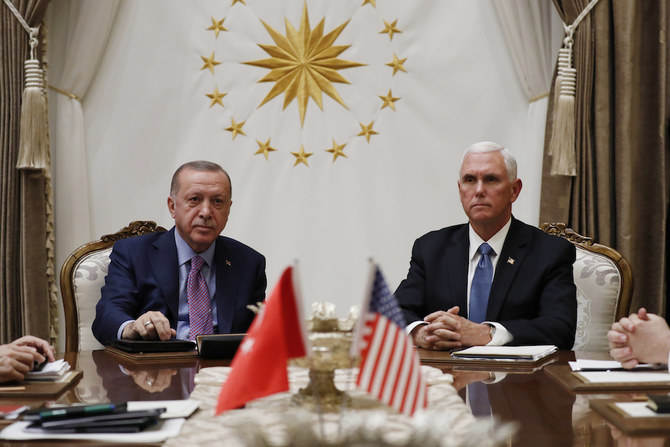
- Kurdish-led authority called for a corridor 'to evacuate dead and wounded civilians'
- Turkish assault has created a new humanitarian crisis in Syria with 200,000 civilians taking flight
Emirati, British FMs discuss regional developments
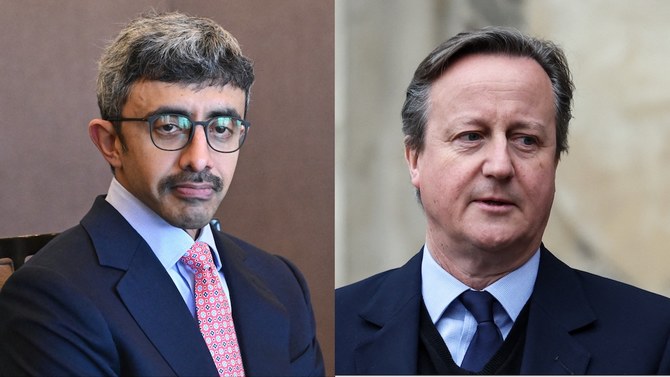
- Call followed Iran’s retaliatory drone and missile attack on Israel on Saturday
LONDON: Emirati Foreign Minister Sheikh Abdullah bin Zayed Al-Nahyan received a phone call from his British counterpart David Cameron regarding the latest regional developments and their impact on global peace and security, Emirates News Agency reported.
The two officials reviewed international efforts aimed at bolstering the response to the deepening humanitarian crisis in Gaza, emphasizing the need to expedite the delivery of safe and sustainable aid to the civilian population there.
The call followed Iran’s retaliatory drone and missile attack on Israel on Saturday.
The strike by more than 300 missiles and drones caused only modest damage in Israel as most were shot down by its Iron Dome defense system and with help from the US, Britain, France and Jordan.
Sheikh Abdullah highlighted the critical need for maximum restraint to prevent severe consequences and the potential escalation of instability in the region.
He underscored the importance of dialogue, diplomatic engagement, adherence to the rule of law, and respect for the UN Charter as vital means to resolve conflicts and enhance regional and global peace, stability, and prosperity.
Crimes by Syrians in Lebanon prompts reassessment of early repatriations
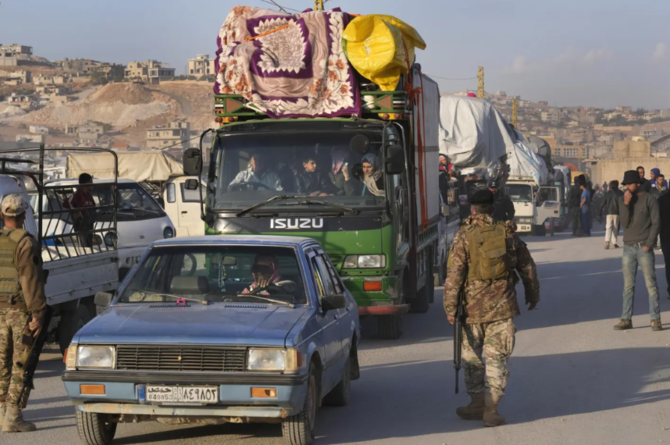
- Latest incident was the killing of an official in the Lebanese Forces Party, Pascal Suleiman
- Lebanon currently hosts around 2 million Syrians, most having arrived since 2011
BEIRUT: The UN High Commissioner for Refugees reiterated on Tuesday “the right of Syrian refugees in Lebanon to return freely to their homeland whenever they choose to do so.”
It came as the campaign against the continued presence of Syrian refugees in Lebanon intensified against the backdrop of crimes committed by Syrians in recent weeks.
The latest incident was the killing of an official in the Lebanese Forces Party, Pascal Suleiman, last week after his car was stolen and his body taken to the Lebanese-Syrian border.
It was preceded a few days earlier by another crime committed in the Achrafieh area in Beirut against a husband and wife by their Syrian maid and other Syrians in and intended robbery. The husband died following the incident and his wife seriously injured.
On Tuesday morning news broke of the death of Lebanese Yasser Al-Kokash in the town of Al-Azzounieh in Aley district at the hands of Syrian citizens after they tied him up and stole the contents of his apartment.
Syrian refugees started coming to Lebanon in 2011. The number of refugees registered with the UNHCR has decreased to less than one million people after some returned to their country. However, after the UNHCR stopped registering Syrian refugees in 2015, the rate of illegal crossings from Syria to Lebanon increased.
Lebanon estimates the number of Syrian refugees on its territory to exceed 2 million people.
Caretaker Minister of Interior Bassam Mawlawi estimated the percentage of Syrian detainees and convicts in Lebanese prisons to be about 35 percent of the total prison population.
The Lebanese General Security has organized voluntary repatriation trips for Syrian refugees, but only a few thousand refugees returned, as the Syrian regime decides who can return according to lists of names provided by the Lebanese General Security to the relevant Syrian authorities.
In a statement, UNHCR spokeswoman Dalal Harb said: “We support and respect the humanitarian right of refugees to return freely and voluntarily to their home country, whenever they choose to do so, in accordance with international principles and non-refoulement.”
Harb stressed that “most Syrian refugees express their desire to return to Syria, but their decision is based on several factors, including safety, security, housing, access to basic services, and securing livelihoods.”
He added the UNHCR “will continue to cooperate with the General Directorate of General Security, which facilitates the repatriation of the refugees who want to return to Syria by registering their names.”
Ahead of the Brussels Conference on Refugees on April 30, Lebanon has urged donors to secure assistance to cover the cost of the Syrian presence in the country.
Minister of Information Ziad Makary said on Tuesday: “The illegal infiltration of Syrian refugees through the sea from Lebanon into Cyprus has caused a diplomatic crisis.
“The crimes that have occurred made us focus more on this existential problem for Lebanon. The solution is for them to either return to Syria or go to a third country.”
Makary also went over the decisions taken, such as “the circular aiming to close all the unauthorized institutions owned by Syrians.”
He considered that “convoys of return require a political solution with Syria.”
A plan proposed by the ministers of labor and social affairs, the Maronite League, and the General Directorate of General Security was also addressed, which aims to repatriate Syrians, calls for the establishment of a National Emergency Authority headed by the prime minister.
It will be in charge of communicating with UNHCR officials in order to assist the state in classifying Syrians into three categories.
The first includes Syrians registered with the UNHCR as refugees and who can return to safe areas of their country. The second category includes Syrians who are registered with the UNHCR as refugees and work in Lebanon, while the third includes those who are registered with the UNHCR as refugees and want to travel to a third country.
As for the Syrians residing illegally in Lebanon, a “ministerial committee headed by the interior minister will be in charge of putting together lists of names indicating whether those Syrians have a valid residency or an expired one, and whether they have any documentation.”
The plan also stipulates that “land borders will be controlled, as it appeared that infiltration is mostly happening for economic reasons rather than security reasons.”
A delegation headed by Lebanese Forces MP Sethrida Geagea met Interior Minister Bassam Al-Mawlawi on Tuesday. Geagea called for “the implementation of the interior ministry’s circulars related to handling the illegal Syrian presence.”
Geagea estimated the number of Syrian refugees “in the northern Christian cities, Mount Lebanon and Jezzine to be around 830,000.”
She said that “implementing these circulars allow us to reduce the number of refugees very soon,” adding: “According to the United Nations, Lebanon is not a country of asylum, but a country of transit. We’ve been tolerating this since 2011, but we cannot do this anymore.”
Heavy rains lash UAE and surrounding nations as the death toll in Oman flooding rises to 18
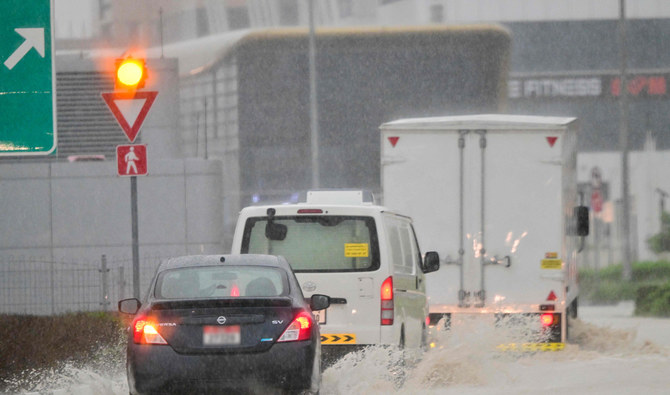
- Flights were canceled in Dubai while schools were shut in United Arab Emirates and Bahrain
- Some inland areas of the desert country recorded more than 80 millimeters (3.2 inches) of rain
DUBAI: Heavy rains lashed the United Arab Emirates on Tuesday, flooding out portions of major highways and leaving vehicles abandoned on roadways across Dubai. Meanwhile, the death toll in separate heavy flooding in neighboring Oman rose to 18 with others still missing as the sultanate prepared for the storm.
The rains began overnight, leaving massive ponds on streets as whipping winds disrupted flights at Dubai International Airport, the world’s busiest for international travel and the home of the long-haul carrier Emirates.
Police and emergency personnel drove slowly through the flooded streets, their emergency lights flashing across the darkened morning. Lightning flashed across the sky, occasionally touching the tip of the Burj Khalifa, the world’s tallest building.
Schools across the UAE, a federation of seven sheikhdoms, largely shut ahead of the storm and government employees were largely working remotely if able. Many workers stayed home as well, though some ventured out, with the unfortunate stalling out their vehicles in deeper-than-expected water covering some roads.
Authorities sent tanker trucks out into the streets and highways to pump away the water.
Rain is unusual in the UAE, an arid, Arabian Peninsula nation, but occurs periodically during the cooler winter months. Many roads and other areas lack drainage given the lack of regular rainfall, causing flooding.
Initial estimates suggested over 30 millimeters (1 inch) of rain fell over the morning in Dubai, with as much as 128 mm (5 inches) of rain expected throughout the day.
Rain also fell in Bahrain, Qatar and Saudi Arabia.
In neighboring Oman, a sultanate that rests on the eastern edge of the Arabian Peninsula, at least 18 people had been killed in heavy rains in recent days, according to a statement Tuesday from the country’s National Committee for Emergency Management. That includes some 10 schoolchildren swept away in a vehicle with an adult, which saw condolences come into the country from rulers across the region.
Education in crisis: Gaza’s schools destroyed amid Israel’s war
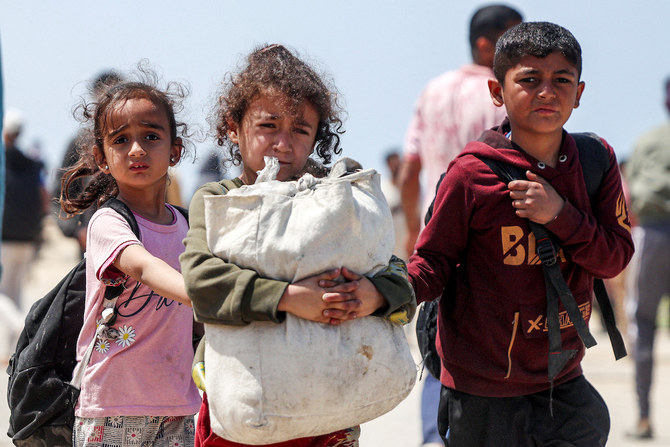
- March report found approximately 87.7 percent of school facilities in Gaza had been either damaged or destroyed
LONDON: The long-term potential of and opportunities for children in Gaza is being severely threatened by the Israel-Hamas war, charity Save the Children has said.
All schools in Gaza have been closed since Israel launched its offensive in October, impacting 625,000 students. Meanwhile, relentless airstrikes have destroyed every university in the Strip.
Ahmad, a displaced father in Rafah, shared his despair for the future of his three children. “I can’t see a life for them anymore,” he said.
For Ahmad and countless other parents, the primary goal is keeping their children alive.
But, said Save the Children, many are aware that even if they survive the immediate threats of bombings and starvation, their education and development will be hugely impacted.
A report published in March found approximately 87.7 percent of school facilities in Gaza had been either damaged or destroyed. A total of 212 school buildings received direct hits, while a further 282 sustained various degrees of damage.
Access challenges, especially in the North Gaza governorates, has led the Education Cluster to conduct a satellite-derived damage assessment to confirm the state of educational facilities.
According to International Humanitarian Law, schools generally should not be targeted and such attacks represent severe violations against children. Prolonged absence from school is considered likely to cause not just a break in learning but regression in progress, according to Save the Children.
Past experiences indicate that children are less likely to return to school the longer they are away from it, jeopardizing their prospects for economic well-being and mental and physical health. They also face increased risk of violence and abuse.
“Children have no escape from the reality of war, no stable routine, no opportunity to learn or play – and for many, no family. These are essential protective factors that children need to mitigate against the risk of lasting mental harm,” said a statement from Save the Children.
Children in Gaza have consistently expressed a strong desire to return to school, citing it as one of their top priorities for restoring a sense of normalcy and continuing their educational and social development.
“A few days ago, one of my children told me, ‘I want to eat healthy food. I really want to go to school and live my old, normal life. And I want to play’,” said Maher, a father in Gaza.
Save the Children has called for an immediate and comprehensive ceasefire and an end to the siege on Gaza.
It has urged the reopening of all crossings to ensure the flow of both commercial and humanitarian goods, as well as demanding that the Israeli government ceases unlawful attacks on educational facilities and fully implements the Safe Schools Declaration.
Denmark to close its Iraq embassy
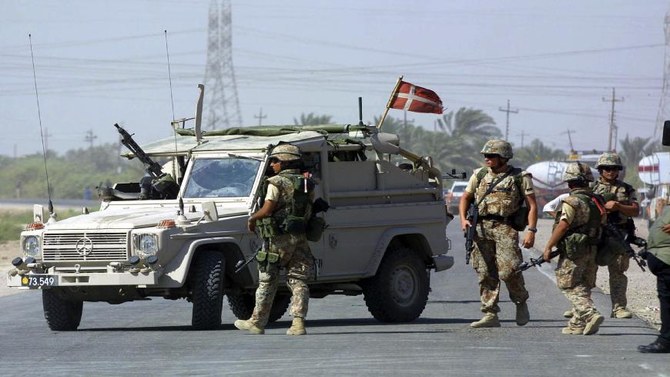
OSLO: Denmark will close down its embassy in Iraq on May 31, the Danish foreign ministry said in a statement on Tuesday.
The diplomatic mission in Baghdad was formally opened in 2020 to support the Danish command over and contribution to the NATO Mission Iraq (NMI).
The majority of the Danish military contribution has since been withdrawn.




